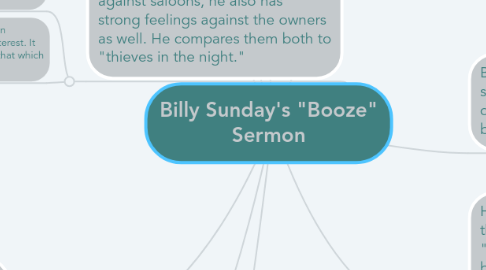Billy Sunday's "Booze" Sermon
by Hannah Beth

1. Sunday shed light on the crime rate that had resulted from liquor, as well as the damage that it had caused many families. Liquor not only resulted in crimes and killing, but it also resulted in the division of families and poverty.
1.1. This brought about much pain and sorry
1.2. He uses the example of Kansas to show that because it is a dry State they do not suffer from poverty and crime right due to alcohol.
2. He refers to the saloon as "the sum of all villainies"
2.1. By this he means that it is the primary source of crime and misery. No good comes from it.
2.2. Billy goes on to address the issue of the money that gets poured into institutions to care for the "insane" people that the saloons produce. It is innocent people who are forced to pay for the upkeep of these institutions. Billy is bringing attention to the fact that if the saloons were closed then there wouldn't be such a great need for the institutions that are taking such a great deal of money to run.
2.2.1. While many are suffering and having to pay to keep these types of people in institutions, it is the saloon owners who are keeping all the money and benefiting from the ruining of lives that alcohol has caused.
2.3. The saloons produce nothing but damage and devastation.
3. With the amount of money that it takes to care for the "whiskey criminals", Billy is saying that the nation will go bankrupt.
3.1. He confronts the lie in the fact that saloons are not needed for revenue because the damage they are creating is costing far more than any form of revenue they are producing.
4. While Sunday has strong feelings against saloons, he also has strong feelings against the owners as well. He compares them both to "thieves in the night."
4.1. While saloon owners not only take money for the liquor, they also take integrity and decency.
4.2. A saloon has no concern about an individual's well-being or best interest. It stands for all things opposite of that which is good.
5. He paints a very real picture of the hoards of people who subject themselves to the saloons and drown their life away in alcohol.
5.1. He speaks about the deaths/suicides and funerals that have amounted over time due to this lifestyle.
6. The money that is spent on alcohol was astronomical. People would spend their hard earned money on a quart of booze instead of spending it on things that really mattered such as food for their family or clothes for their children.
6.1. Billy encourages to spend and invest in things that are more beneficial and that produce fruits of labor instead of throwing it all down the drain.
7. Promoted the Prohibition
8. Billy Sunday was very clear on his stance against alcohol and the detrimental effects that were brought about because of it
8.1. He believed that alcohol was from and belonged in Hell.
9. He held the stance that to say that the saloon was needed to help "lighten the taxes" was a lie, because the revenue made did not outweigh what it took to keep it running.
9.1. He challenged anyone to show the good that the saloon had done for families, churches, morals, etc...
10. Billy reminds the church that they are the ones that can make a difference in this matter by voting against the saloons.



